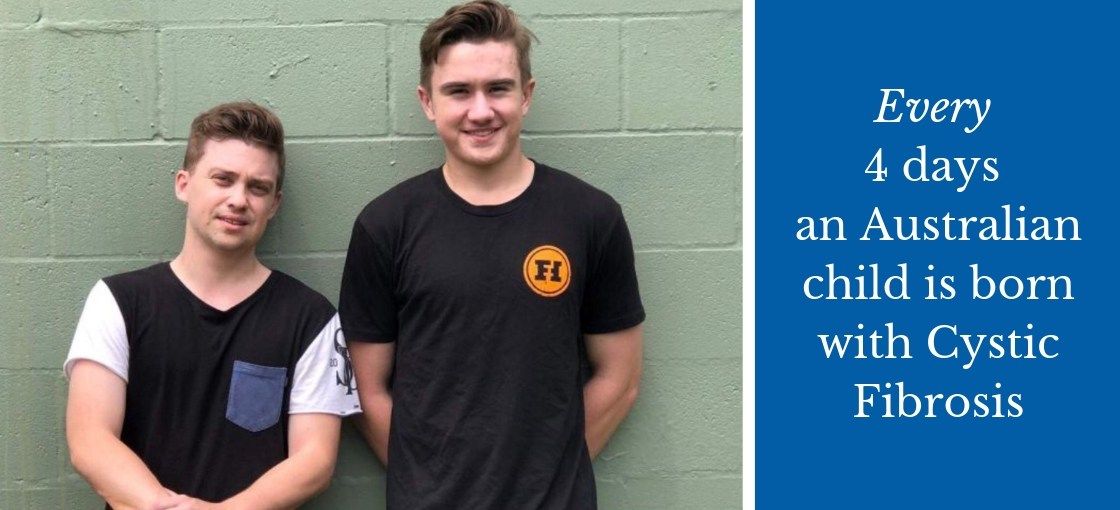Cystic Fibrosis trials

In Australia, a baby is born every four days with cystic fibrosis (CF).* There is currently no cure for the genetic disorder which primarily affects the lungs and digestive system, reducing life expectancy to 37.^
Cystic fibrosis impacts the respiratory and gastrointestinal systems, as well as the pancreas. With such a broad toll being taken on the body, the treatment is notoriously difficult to upkeep. Therefore patients face a significant emotional, physical and financial burden.
Meet Ben and James
The Crew family are very familiar with the challenges of CF. Brothers Ben and James were both born with the disease. But nine years apart.
At the age of 31, older brother Ben’s journey has been incredibly difficult. He’s already undergone a double lung transplant. As a result, he feels the toll CF takes on his body day-to-day.
“Everything that should have just been ‘second nature’ does tax you. And takes a lot out of you,” said Ben.
Mater Research
But researchers at Mater in Brisbane are looking to change the journey for people like Ben. They’re currently implementing a trial of a new triple-combination drug that could increase their life expectancy.
Dr Lucy Burr, Mater’s Director of Cystic Fibrosis and Mater Research Institute-The University of Queensland (MRI-UQ) researcher, said Mater had seven patients enrolled in Phase 2 of the clinical trial. This aims to treat the underlying cause of CF in approximately 90 per cent of CF patients.
“The new drug known as VX-445, in combination with two existing treatments, has demonstrated lung function improvement of around 10 per cent. This is really significant for cystic fibrosis patients,” said Dr Burr.
“Patients in our trial had significant increases in their lung function that they hadn’t been able to achieve previously.”
One of these patients is Ben’s younger brother James. And for him, the impact was immediate.
“Before the trial I was about 64 per cent lung capacity. But within a week, I was up in the 90s,” said James.
Ben and James’ parents, Bernie and Sharon, watched on in awe as James’ health suddenly and drastically improved.
“He had more energy; he wasn’t getting sick as often,” said Bernie.
“He’s eating us out of house and home; he’s putting on weight; muscle,” added Sharon.
As co-author of the paper and site principal investigator, Dr Burr agreed that the early phase study showed some really exciting progress.
“In CF, most patients will die from lung disease. So improving or maintaining their lung function is the mainstay of treatment.”
The treatment journey
Alongside this trial, Dr Burr is undertaking ongoing research into improving the treatment journey for patients with cystic fibrosis who are transitioning from paediatric to adult care.
Funded by a Betty McGrath Fellowship, which is only made possible by generous supporters of Mater Foundation, the research investigates a number of approaches to lessening the burden for patients. This includes smoothing the transition between hospitals so that patients do not have to repeat their clinical history to each new clinician they encounter. Through to improving antibiotic affects on gut bacteria and the lungs. And also improving access to newly developed drugs, like VX-445.
Dr Burr explained that treatment using VX-445 is based on treating the dysfunction of a protein called CFTR. In CF cases, CFTR doesn’t do its job to transport salt and water in and out of cells.
“This affects the pancreas, liver, lungs, sinuses… everything. A lot of our therapies are directed at treating the consequences of CFTR dysfunction. This includes decreased lung function, bowel function, pancreatic problems and really thick, sticky, dehydrated mucus,” said Dr Burr.
Triple-combination therapy
“There are two drugs on the market in Australia which actually target the CTFR protein to make it work better in patients with specific gene mutations–giving access to treatment for about 50 per cent of the CF population. This triple combination has the potential to treat 90 per cent of CF patients.”
Dr Burr said this trial used a triple-combination therapy, to target the CFTR protein in patients with a ‘F508del’ gene mutation.
“Two of the drugs help the protein move through the cell. And one of the drugs helps the protein channel open. Adding the extra drug seemed be the key to making the dual combination work much better,” said Dr Burr.
“What we found in the trial was that the drug improved the protein function, which we measured through sweat chloride in patients. It also significantly improved their lung function and quality of life. And that was only over a four week period.”
Dr Burr said that the development of drugs targeting the CFTR is an exciting step forward for CF care.
“When you’re targeting the actual problem there’s great potential for these medications to change, and lengthen, the lives of patients with CF.”
Support Mater Research
Life-changing medical research is taking place every day at Mater Research, but it can only happen with continued investment finding solutions for our biggest medical challenges.
You can support research at Mater by purchasing your Mater Prize Home lottery tickets today.
*Better Health Channel, 2015.
^Cystic Fibrosis Australia, 2017.
Our latest articles about:
